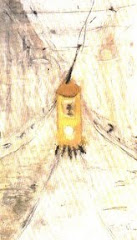James Joyce
(1882-1941)
______________________________
ULYSSES (2)
Of course if they ran a tramline along the North Circular from the cattlemarket to the quays value would go up like a shot.
Claro que si hicieran pasar una línea de tranvía a lo largo de la Circunvalación Norte desde el mercado de ganado a los muelles, el valor subiría como un cohete. (Pág. 143)
A heavy tramcar honking its gong slewed between... The tram passed. They drove off towards the Loop Line bridge, her rich gloved hand on the steel grip. Flicker, flicker: the laceflare of her hat in the sun: flicker, flick.
Se interpuso un pesado tranvía tocando la campanilla... Pasó el tranvía. Ellos iban hacia el puente de la Circunvalación, la rica mano enguantada de ella en el agarradero de acero. Brilla, brilla: el fulgor de encaje de su sombrero al sol: brilla, bri. (Pág. 165)
Trams: a car of Prescott’s dyeworks: a widow in her weeds. Notice because I’m in mourning myself.
Tranvías: un carro de la tintorería Prescott: una viuda en sus crespones. Me doy cuenta porque yo también voy de luto. (Pág. 177)
They waited still, their knees jogging, till they had turned and were passing along the tramtracks. Tritonville road. Quicker. The wheels rattled rolling over the cobbled causeway and the crazy glasses shook rattling in the doorframes... The carriage swerved from the tramtrack to the smoother road past Watery lane. Mr Bloom at gaze saw a lithe young man, clad in mourning, a
wide hat.
—There’s a friend of yours gone by, Dedalus, he said.
Siguieron esperando, con las rodillas oscilantes, hasta que doblaron y fueron siguiendo las vías del tranvía. Tritonville Road. Más deprisa. Las ruedas traqueteaban rodando por la calzada de guijarros y los cristales desquiciados se agitaban traqueteando en las portezuelas... El coche se desvió de las vías del tranvía a un camino más liso, después de Watery Lane. El señor Bloom en observación vio un joven delgado, vestido de luto, sombrero ancho.
—Ahí ha pasado un amigo suyo, Dedalus —dijo. (Pág. 184)
A pointsman’s back straightened itself upright suddenly against a tramway standard by Mr Bloom’s window. Couldn’t they invent something automatic so that the wheel itself much handier? Well but that fellow would lose his job then? Well but then another fellow would get a job making the new invention?
La espalda de un guardaagujas se enderezó de repente contra un poste del tranvía junto a la ventanilla del señor Bloom. ¿No podrían inventar algo automático para que la rueda misma mucho más fácil? Bueno pero ¿ese tipo perdería entonces su empleo? Bueno pero entonces ¿otro tío tendría un empleo haciendo el nuevo invento? (Pág. 189)
—I can’t make out why the corporation doesn’t run a tramline from the parkgate to the quays, Mr Bloom said. All those animals could be taken in trucks down to the boats.
—Instead of blocking up the thoroughfare, Martin Cunningham said. Quite right. They ought to.
—Yes, Mr Bloom said, and another thing I often thought, is to have municipal funeral trams like they have in Milan, you know. Run the line out to the cemetery gates and have special trams, hearse and carriage and all. Don’t you see what I mean?
—O, that be damned for a story, Mr Dedalus said. Pullman car and saloon diningroom.
—No comprendo por qué el ayuntamiento no pone una línea de tranvías desde la puerta del parque a los muelles —dijo el señor Bloom—. Se podría llevar a todos esos animales en furgones hasta los barcos.
—En vez de tapar el paso, dijo Martin Cunningham. Es cierto. Deberían.
—Sí —dijo el señor Bloom—, y otra cosa que he pensado muchas veces es poner tranvías fúnebres municipales como tienen en Milán, ya sabes. Extender la línea hasta las puertas del cementerio y tener tranvías especiales, coche fúnebre, coche para el duelo y todo eso. ¿Comprendes lo que quiero decir?
—Sería un asunto fenomenal —dijo el señor Dedalus—. Coche butacas y vagón restaurante. (Pág. 198)
Tranvía fúnebre










